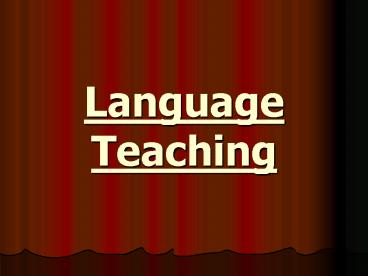Language Teaching - PowerPoint PPT Presentation
1 / 19
Title:
Language Teaching
Description:
What are the language content and skills areas in an English ... Stories Poems Songs Dialogues Playlets ... grammar Selection of teaching ... – PowerPoint PPT presentation
Number of Views:161
Avg rating:3.0/5.0
Title: Language Teaching
1
Language Teaching
2
- 1. What are the approaches in learning and
teaching of a new language ? - i. Presentation with application
- - provide a meaningful context
- - involvement of learners
- - presentation related to function
- - awareness of why and how
3
- ii. Practice with application
- - opportunity to practise it thoroughly
- - meaningful learning activities
- iii. Production with application
- - need to produce
- - product is meaningful
4
2. What are the language content and skills areas
in an English language programme ?
- English Language Programme
- New language items and structures
- Specific listening- comprehension targets
- Intensive reading of passage in the textbook and
specified reading skill - Oral English programme (Content for spoken
English) - Supplementary learning activities
5
- Vocabulary work
- Guided writing tasks
- Passages for dictation, spelling and punctuation
skills - Poems , dialogues etc. for memory work
- Drama, role-play , music
6
Specify objectives for the English Language
Programme .
7
- 1. Selection of content
- Language items Vocabulary
- Materials
- Stories
- Poems
- Songs
- Dialogues
- Playlets
8
- Selection of skills
- Skills
- listening
- speaking
- reading
- writing
- sound system
- grammar
9
- Selection of teaching strategies
- ( Play- way methods Topic or thematic
approaches Communication skills approaches ) - Activities
- Role-play
- Music
- Dialogues
- Story-telling
- Acting
10
4. Guide-lines for selection of Content, Skills
and Strategies
- Content
- Simple sentence structures and vocabulary used in
everyday situation. - Language forms used in everyday communications
questions, requests, statements - Language items and vocabulary related to a topic
or theme
11
- Skills
- At initial stage , only listening and speaking
skills are taught. (serious work) - Reading and writing are introduced later
- b. Simple sub-skills will be selected for
beginning stages - c. Selected skills may be taught separately on
in activities where skills integrated
12
- Strategies
- a. Methods will be activity centred and to be
related to the pupils interest and enjoyment - b. A topic or thematic approach will give
interest and focus to the learning experience - c. Skills in language will be related to language
functions in communications.
13
What is Supplementary Learning Programme?
- Learning activities that a teacher can freely
innovate - Activities that devise imaginative and purposeful
learning - Activities that make full use of the learning time
14
Aims of the Supplementary Learning Programme
- To provide variety of English language learning
activities which are not specifically prescribed
in the syllabus and textbook but which suit the
needs and interest of the learners - To encourage pupils to work at a level and with
materials which they find both purposeful and
challenging - To organize supplementary activities in such a
manner that maximum use is made of the time
available for learning throughout the school term
and year
15
Types of Supplementary Activities for English.
- Short activities ( 10-15 minutes)
- Focus on specific skills / integration of skills
- May be self-instructional / end of a lesson
- Language games
- Songs
- Rhymes, poems, riddles
- Vocabulary cards
- Listen and do activities
- Listen and read
16
Types of Supplementary Activities for English.
- Longer activities ( 30- 40 minutes)
- Done in class or part of extracurricular
programme - Can be assigned as homework
- Reading cards (self instructional)
- Supplementary readers
- Read and do/ make/ write/ draw
- Listen and read/write
- Games/Songs/Poems
- Drama, role-play
- Debates, discussions, Young speakers
17
Types of Supplementary Activities for English.
- Project / Thematic work ( 3-4 weeks or 1 term)
- Work/activities extended for a long period of
time - Project work
- School/Class visits, outing
- Exhibitions for library week
- English Language weeks/ month
- English Language magazine
- Interclass/ house competitions
- School plays/ English concerts
- Project books
18
7. Integrated Language Skills Activities.
- A teacher must identify the kind of integrated
language activities to be used in class and the
purpose of such integration - Study the -
- Advantages of integrating language skills
- Advantages of practising specific language skills
separately
19
Integrated language activities that you carry out
in your classroom.
- Making a weather chart
- Talking and writing about a flowering plant
- Finding out (orally) about a wanted person and
write a description - Making a model
- A class mini survey































